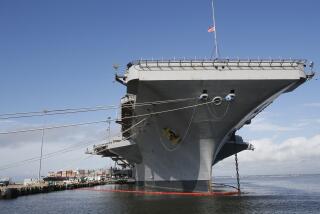Panel to Review Navy’s Ship-Scrapping Methods
- Share via
The Defense Department is creating a high-level panel to review the Navy’s troubled ship-scrapping program, which has harmed workers and polluted waters at ports around the United States.
The panel, which will be headed by a senior department official and include representatives from at least six government agencies, is expected to examine a broad range of safety, environmental and public policy issues and make recommendations in 60 days on reforming the ship-scrapping program.
“Ships are very complex systems, and we want to ensure we scrap these vessels in an environmentally sound, safe, affordable and commercially feasible way,” said Patricia A. Rivers, who is heading the panel. Rivers is responsible for developing environmental cleanup policy for the Defense Department worldwide.
The appointment of the panel comes amid increasing criticism of the Navy’s ship-scrapping program from members of Congress and environmentalists. It follows reports by the Baltimore Sun that documented how the scrapping industry has left a dismal record of deaths, accidents, fires, mishandling of asbestos and environmental violations wherever it goes.
The Defense Department panel was set up by Jacques S. Gansler, undersecretary of defense for acquisition and technology. It will include representatives from the Navy, Defense Logistics Agency, Maritime Administration, Environmental Protection Agency, Occupational Safety and Health Administration and State Department. The group is expected to hold its first meeting next week.
Since 1991, as the Navy downsized, the Defense Department has sold its old warships to private contractors, who would try to make a profit by selling steel from the ships. But many of those contractors cut corners, leading to serious worker safety abuses and environmental violations at U.S. ports.
Officials of the Navy and Defense Logistics Agency, which handles ship sales for the Navy, have acknowledged that the scrapping program has been flawed but said they had tightened bidding procedures in 1996 to weed out unqualified contractors. They said they were convinced that a scrapper could buy a ship, follow environmental and safety laws in breaking it up, and still make a profit.
But critics contend that the Navy and Defense Department need to rethink their whole approach. They say the Navy should subsidize the disposal of its obsolete ships instead of making money from them.
One of the most significant issues to be addressed is whether American warships should be scrapped in the Third World, where worker safety and environmental regulations are virtually nonexistent. Last month, Navy Secretary John H. Dalton suspended a controversial proposal to send warships overseas for disposal; the plan had come under increasing fire from members of Congress and environmentalists.
More to Read
Sign up for Essential California
The most important California stories and recommendations in your inbox every morning.
You may occasionally receive promotional content from the Los Angeles Times.













